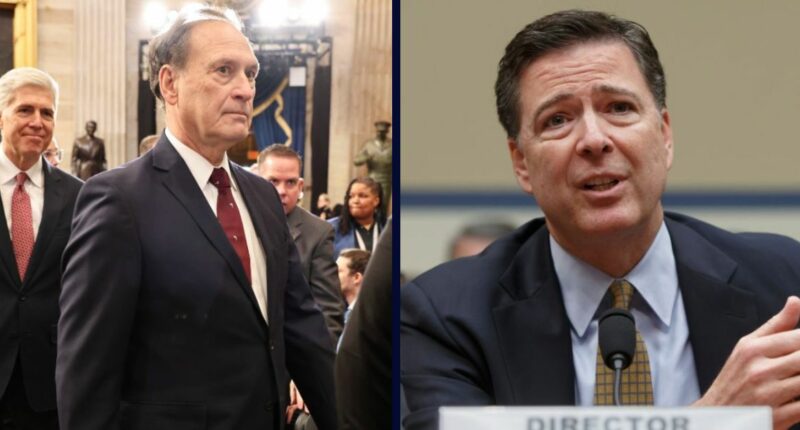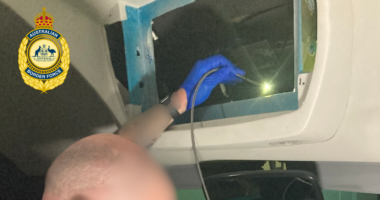Share this @internewscast.com
Left: U.S. Associate Supreme Court Justice Samuel Alito Jr. attends inauguration ceremonies in the Rotunda of the U.S. Capitol on January 20, 2025 in Washington, DC (Chip Somodevilla/picture-alliance/dpa/AP Images). Right: FILE – FBI Director James Comey testifies on Capitol Hill in Washington before the House Oversight Committee to explain his agency”s recommendation to not prosecute Hillary Clinton on July 7, 2016 (AP Photo/J. Scott Applewhite, File).
Nearly four decades ago, a notable figure in today’s U.S. Supreme Court, known for his conservative stance, had insights while working as a lawyer at the Department of Justice. These insights are now being invoked by former FBI Director James Comey in an effort to argue that his criminal prosecution, endorsed by President Donald Trump, is legally invalid and should be swiftly dismissed.
As Comey prepares to file motions to dismiss the charges of false statements and obstruction, Law&Crime highlighted a critique by Ed Whelan of National Review. Whelan, a former clerk for Justice Antonin Scalia and a past principal deputy assistant attorney general at the DOJ’s Office of Legal Counsel (OLC), was among the first to question the legitimacy of the charges, particularly concerning the appointment of Lindsey Halligan.
Lindsey Halligan, who previously worked as a Florida insurance attorney and served as Trump’s personal lawyer in the Mar-a-Lago classified documents case, as well as in a failed defamation suit against CNN, allegedly was not lawfully appointed as interim U.S. attorney following Erik Siebert’s resignation. Whelan pointed this out, suggesting her appointment might not have been valid.
Whelan, in two September articles, argued that Halligan’s potentially invalid appointment posed a “fatal legal flaw” in the case. He referenced the DOJ’s long-held position that the U.S. attorney general is prohibited from making successive interim appointments of U.S. attorneys, in accordance with federal statutory law.
This perspective was initially articulated by none other than Justice Samuel Alito in a 1986 opinion he penned while serving as a deputy assistant attorney general at the OLC. In his memorandum, Alito asserted that Congress has the authority to impose limitations on statutory powers to make interim appointments.
Comey’s legal team has now referenced this same OLC opinion by Alito in their filings, arguing that it supports their case for dismissal.
Comey’s lawyers have now cited the very same Alito OLC opinion. According to the filing (citations removed):
It was not until 1986 that Congress for the first time gave the Attorney General a role in appointing interim U.S. Attorneys, adopting a version of the statute that mirrors the language as it exists today.
Just three days after Congress enacted the 1986 law, the Office of Legal Counsel (OLC) within the DOJ issued a memorandum, authored by then-Deputy Assistant Attorney General Samuel Alito, interpreting the provision in precisely the same manner as Mr. Comey here. Specifically, OLC concluded that while a “vacancy exists when the 120-day period expires under the amended section 546 and the President has either not made an appointment or the appointment has not been confirmed,” “it does not follow that the Attorney General may make another appointment pursuant to 28 U.S.C. 546(a) after the expiration of the 120-day period.” OLC reasoned that “[t]he statutory plan discloses a Congressional purpose that after the expiration of the 120-day period further interim appointments are to be made by the court rather than by the Attorney General.” That “contemporaneous[]” Executive Branch interpretation provides persuasive evidence of statutory meaning.
For Comey and his legal team, Alito’s words amount to the executive branch’s “longstanding interpretation dating back to the original enactment of the provision at issue,” meaning Halligan’s appointment runs “directly contrary to the statutory text, structure, history, and purpose” of the law.
“By purporting to appoint Ms. Halligan under Section 546, the President and Attorney General have disregarded that considered judgment and sought to reinstate a regime that Congress expressly repudiated,” the filing said, noting that Halligan was the only known prosecutor to present the case to a grand jury and sign the indictment mere days before the statute of limitations expired.
Beyond questions of whether the former Trump defense attorney with no prosecutorial experience was lawfully appointed, the circumstances surrounding Halligan’s installation already raised questions about her qualifications for the role. A story from Lawfare’s Anna Bower, which went viral Monday, took that scrutiny a step further.
It was revealed that the Eastern District of Virginia’s rookie interim U.S. attorney, who minored in broadcast journalism, reached out to the journalist via Signal, unsolicited, to reproach her about her reporting on the Letitia James case — while evidently operating under the assumption that the exchange Bower did not initiate was off the record.














